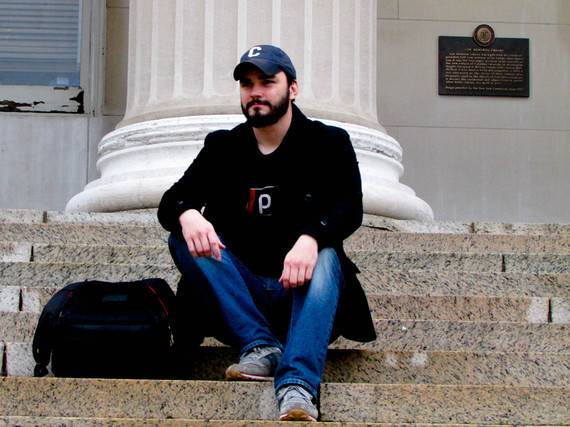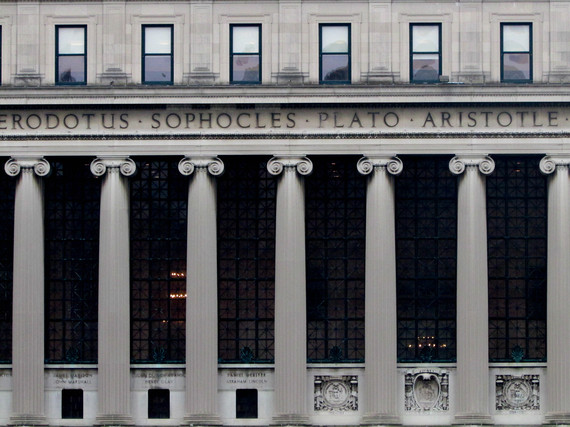Alexander McCoy is a current sophomore in Contemporary Civilization at Columbia University. Photo credit: Gabriella Levy.
Before coming to Columbia University two years ago, Alexander McCoy served as a guard for the U.S. Embassy in Saudi Arabia, where he witnessed a beheading in Riyadh.
"Reading the Qur'an really helped me put that memory to bed and find peace, because I discovered that the words in this book were not the same as the emotions that I was experiencing in that crowd," he said.
McCoy studied the Qur'an in Contemporary Civilization, which was originally devised to help returning soldiers cope with the realities of the First World War. It is one of six classes comprising Columbia University's Core curriculum, which also includes Literature, Art, and Music Humanities, Frontiers of Science, and University Writing.
"I see the Core as a collection of motifs that are integral to what we call the Western tradition," said Natalie Felsen, a student liaison on the Committee for the Core. "There were times when I was in various Core courses and they all cross-connected."
Columbia students must take some iteration of the Core to graduate, so regardless of major, nearly all co-eds read Homer and Virginia Woolf. In a recent survey of 128 students in Literature Humanities or Contemporary Civilization, 67.2% of respondents answered that they were excited to take the standardized curriculum before attending Columbia. For 85.9%, it has either met or exceeded expectations.
Still Roosevelt Montás, Director of the Center for the Core, is aware of his program's pitfalls. Though he took issue with the concept of a "Western tradition," he noted that if the Core were being created today, it would probably include "other major civilizational traditions." Still, like Felsen, he appreciates its interdisciplinary nature.
"It builds a coherence of conversation," he said. "For us who live in the West, it has special relevance because it allows us to see the evolution of the institutions, the categories, the idioms that we use today."
However, recent campus activism indicates that not everyone feels validated by the Core. Students have shared stories about their experiences with institutional racism propagated by the classes, expressing concerns about unrepresented voices.
At one rally, undergraduates articulated their disillusionment with the curriculum while demonstrating their solidarity with minority peers at Yale and the University of Missouri. Gabi Mayers, who participated in the speak-out, still wants to know how her Core courses relate to the current situation in the United States. "We're putting out the same old ideas, but we're not putting out new ones that are also changing with our new world," she said.
She remembers when her Literature Humanities professor proposed adding Song of Solomon to the syllabus before it became a permanent fixture last year: "One guy interrupted and said, 'I don't think we should study Toni Morrison. I studied a lot of African-American history in high school, and now I want to study real history.'"
Contemporary Civilization instructor Yohann Ripert, who sees the readings as a jumping-off point for discourse and critique, emphasized that the texts should be taken with a grain of salt. "This is why this is discussed as a seminar and not a lecture: to allow you to react to it, to disagree with it," he said. "And at the end of the whole reading, you'll disagree even more. All the better! But at least you'll be armed with all of the references. Now, you're informed. Now, you know why you disagree."
Names of prominent Western thinkers are carved into the facade of Butler Library, a key student haunt for Columbia undergrads. Photo credit: Gabriella Levy.
The University of Chicago has a core curriculum reminiscent of Columbia's. Last semester, University of Chicago junior Austin Brown studied in Vienna as part of his Civilizations requirement, the counterpart to Columbia's Contemporary Civilization and Global Core. Brown admitted that colleagues sometimes take issue with their standardized science courses, which are often seen as a joke. However, the humanities curricula are not top priority on the University of Chicago's activist agenda.
"Sometimes I do find it surprising that people don't talk more about how it's just old white men," Brown said. "It almost feels like people are tired of talking about it. People have talked about it so much, and we have more relevant things to talk about."
"There's a big group geared towards addressing sexual assault on campus," he continued. "There's a huge racial equality movement. Stuff like that that's very active. I feel like people who would otherwise be invested in talking about those issues are talking about them, but on an already 'adult' scale."
Meanwhile, for McCoy, discerning engagement with classical texts feels urgent at U.S. universities. "We see a lot of conflict, a lot of fear," he said. "There's been calls in the American public debate to ban Muslim refugees from Syria. I think back to reading these books, and I don't understand that. I wish we had more of this kind of curriculum -- not just at Columbia, but at every school."

